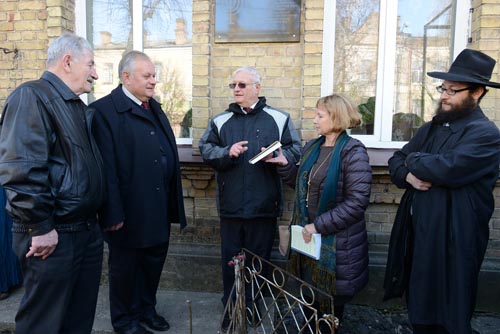
LVIV, Ukraine (Press Release)– Professor Fania Oz-Salzberger, the daughter of acclaimed Israeli novelist Amoz Oz, retraced the footsteps of her father’s best-selling memoir A Tale of Love and Darkness on Wednesday, Nov. 12, in the northern Ukrainian city of Rivne, as part of the four-day conference Limmud FSU Ukraine in Lviv.
Oz-Salzberger, an author, historian and professor in the Faculty of Law and the Center for German and European Studies at Haifa University, visited the childhood home of her great-grandparents, guided by her father’s book about their family and Jewish life in Rivne, known as Rovno in Russian. The Mussman family left Rovno for pre-state Palestine in 1933. Fania Mussman, one of the family’s daughters, was the mother of Amos Oz and grandmother of Oz-Salzberger, who is named after her.
The sold-out Limmud FSU Ukraine opened Nov. 6 in Lviv (Lvov in Russian), with a moment of silence for Ukrainians who have fallen in the country’s ongoing civil conflict. Limmud FSU, the highly regarded global educational and cultural conference for Russian-speaking Jews, is being held at the Hotel Dnister.
Chaim Chesler, founder of Limmud FSU, was thrilled by the event and the overwhelmingly positive response. “The success of an event like this, which is organized and run purely by volunteers, is so heart-warming that we will seriously consider holding a Limmud FSU conference in Lviv on an annual basis,” he said.
Oz-Salzberger’s tour included a visit to the Mussman family home, on 31 Dubinska Street, which still stands. The city’s Mayor, Volodymyr Khomko, made a welcome speech, while Oz-Salzberger read a passage from her father’s memoir and unveiled a special memorial plaque prepared by Limmud FSU.
Oz-Salzberger also visited the former site of the Tarbut School, where her grandmother Fania and her two sisters studied. A nearby synagogue caters to the 600 Jews still living in the community. Oz-Salzberger said her father finds it hard to visit Rovno because of his mother’s memories, and he doesn’t want to color the memories with reality. Still, she added she was very touched to see this part of the puzzle of her family’s history.
The Hesed Osher welfare center, built by the American Jewish Joint Distribution Committee (JDC), serves as the city’s Jewish cultural center. Visiting the center, Oz-Salzberger conducted a dialogue, in Hebrew with Russian translation, with Prof. David Assaf of Tel Aviv University, on the connection between history and literature.
Rovno was overrun by the Nazis in 1941 and thousands of Jews were shot. The remaining Jews from Rovno and the vicinity were herded to the nearby Sosenki Forest, which is marked by ravines within a dense birch forest. There, on the edge of the ravines, some 22,000 Jews were shot, bringing to a close the 600-year history of the city’s Jewish community. Oz-Salzberger and her group listened to Kaddish, the Jewish prayer of mourning, recited by the local Chabad rabbi in memory of the victims, including members of her own family.
Limmud FSU Ukraine featured lectures, workshops, presentations and discussions, included such topics as Ukrainian Jews and the State of Israel; the Gulag through the eyes of a witness; Jewish dance; Jewish holy sites in Ukraine; the Ukrainian-Jewish dialogue; cultural aspects of the Jewish-Christian dialogue; the history of Hassidism in Ukraine; the million who changed the face of Israel; the humor of Odessa; Jewish music of Berlin in the 1930s; a Russian accent in Israeli culture; and many more. Orthodox and Reform prayer services were also held for those interested.
Fania Oz-Salzberger was among the Limmud FSU presenters, speaking about Jews and Words, the recent book she wrote jointly with her father. Other speakers included Victor Shenderovitch, a prominent Russian writer, journalist and playwright; the Israeli ambassadors to Belarus, Yosef Shagal and to Ukraine, Eliav Belotserkovsky; Klara Novikova, a distinguished Russian actress; Roman Bronfman, a former member of the Israel Knesset; Yuri Volodarsky, a leading literary critic and journalist; prominent Israeli journalist Mordechai Haimovitch of the newspaper Ma’ariv; David Assaf; Igor Schupak, the head of “Tekuma,” the All-Ukrainian Center for Holocaust Studies, and other leading academics and scholars, businessmen, writers, artists, journalists, and community leaders and activists from Ukraine, Russia and Israel.
Limmud Ukraine is sponsored by Limmud FSU and the Rothschild Foundation (UK), in cooperation with the International Fellowship of Christians and Jews.
The Limmud Ukraine Conference partners include the All Ukrainian Jewish Charitable Foundation “Hessed Arieh”, the Embassy of Israel in Ukraine, “Nativ”, the Israel Cultural Center in Kyiv, the American Jewish Joint Distribution Committee, the International Jewish student organization “Hillel,” the Ukrainian Institute of Holocaust Studies “Tkuma” and the Museum “Memory of the Jewish People and the Holocaust in Ukraine,” The Jewish Agency, Emotions’ Holding! FEST,” the “Vudavnytstvo Starogo Leva” Publishing House, the “DikArt Event Management Company,” and other Jewish organizations in Ukraine.
*
Preceding provided by Limmud FSU